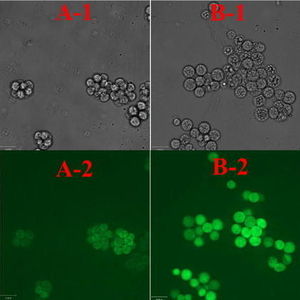Chinese researchers boost algae lipids, reduce peroxidation

Image: The Authors
March 15, 2018
BY Ron Kotrba
Researchers from Nanjing Tech University in China have published a paper in Biotechnology for Biofuels on their method to increase lipid content and reduce peroxidation in Schizochytrium sp., a marine microalgae rich in docosahexaenoic acid (DHA), which is touted for its human health benefits.
The researchers say stress induction to induce higher lipid production in this particular algae lowers biomass content in industrial fermentations, and can result in peroxidation of lipids. As a result of these tradeoffs, the researchers sought to develop new production strains possessing high DHA production capacity along with strong antioxidant defenses.
The work involved a novel, cooperative two-factor adaptive laboratory evolution (ALE) strategy. Low-temperature conditions were used to improve the DHA content, and high salinity was applied to stimulate lipid accumulation and enhance the antioxidative defense systems.
“To our best knowledge, this is the first comprehensive study to take into account both lipid overproduction and lipid peroxidation in the fermentation process,” the authors write. “Taken together, the cooperative two-factor ALE process can not only increase the accumulation of lipids rich in DHA, but also prevent the loss of produced lipid caused by lipid peroxidation. The strategy proposed here may provide a new and alternative direction for the industrial cultivation of oil-producing microalgae.”
Advertisement
The authors of the recently published paper are Xiao-Man Sun, Lu-Jing Ren, Zhi-Qian Bi, Xiao-Jun Ji, Quan-Yu Zhao, Ling Jiang and He Huang.
The full research paper can be viewed here.
Advertisement
Related Stories
The USDA significantly increased its estimate for 2025-’26 soybean oil use in biofuel production in its latest World Agricultural Supply and Demand Estimates report, released July 11. The outlook for soybean production was revised down.
U.S. fuel ethanol capacity fell slightly in April, while biodiesel and renewable diesel capacity held steady, according to data released by the U.S. EIA on June 30. Feedstock consumption was down when compared to the previous month.
The U.S. EPA on July 8 hosted virtual public hearing to gather input on the agency’s recently released proposed rule to set 2026 and 2027 RFS RVOs. Members of the biofuel industry were among those to offer testimony during the event.
The USDA’s Risk Management Agency is implementing multiple changes to the Camelina pilot insurance program for the 2026 and succeeding crop years. The changes will expand coverage options and provide greater flexibility for producers.
The USDA’s National Agricultural Statistics Service on June 30 released its annual Acreage report, estimating that 83.4 million acres of soybeans have been planted in the U.S. this year, down 4% when compared to 2024.
Upcoming Events










